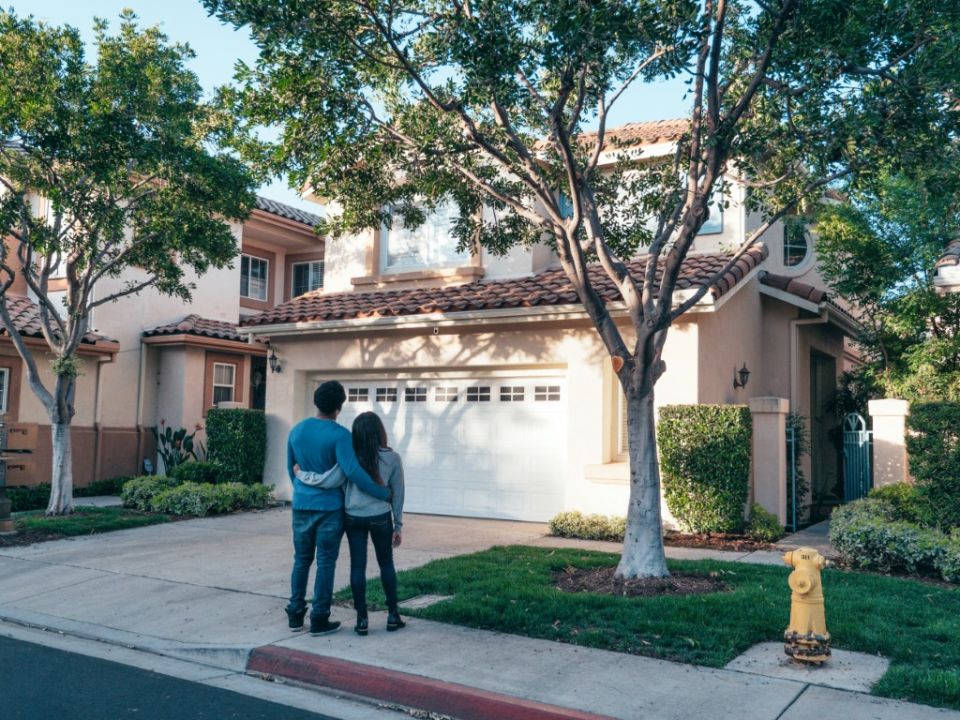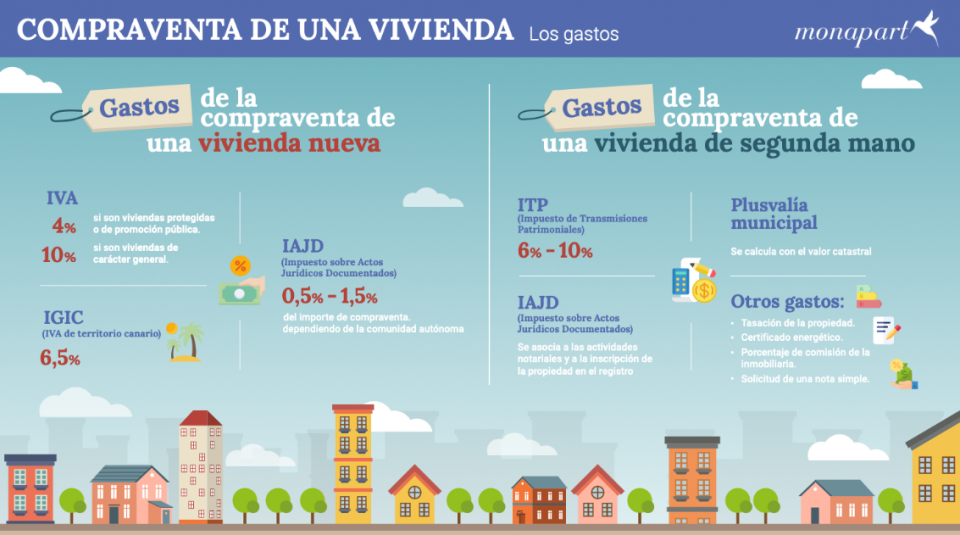Costs of buying and selling a property
Whether you are thinking of buying or selling your flat, in this post we explain the costs involved in a sale and purchase and who is responsible for paying them.
Did you know that there are more expenses arising from the sale of a property than the sale price itself? Whether you're thinking of buying or selling, you've come to the right place. sell your flatAt Monapart we are going to explain what the implicit costs are and who is responsible for paying them. In addition, we will go into the differences between buying a new home and a second-hand one.
What are the costs of buying and selling a property?

Expenses arising from the purchase and sale of a property
Whether we are going to buy the property with or without a mortgage, these are the costs to be taken into account in a mortgage. contract of sale:
- Public deed at the notary's office. When we buy a new or second-hand property, a public deed of sale has to be drawn up, so it is necessary to hire a notary. The fees are regulated by the government and are always the same. However, the total costs may increase depending on different factors, such as the number of copies of the deed, its length, etcetera.
- Registering the property in the Land Register. Once the public deed has been executed, we must register the sale and purchase at the Land Registry. The price of this procedure depends on the value of the propertybut it is usually between 0,1% and a 0,25% of the total price of the property.
- Gestoría. It is only taken out if there is a mortgage involved. The manager is in charge of settling taxes and registering the deed.. Their fees are not regulated, but generally range from €300 to €500.
- Taxes. These vary depending on the autonomous community and whether it is a new or second-hand property.
To avoid surprises when buying and selling a property, experts recommend making an additional provision of 12% on the sale price of the property.
Costs of buying and selling a new home
We have been saying for years that new-build housing was entering with a vengeance. Taxes associated with the sale and purchase of new properties are:
- VAT. Value added tax is only payable when the property is first purchased from the developer. If we have lived renting before buying it, we will also have to pay VAT. We will pay:
- A 4% whether it is subsidised or public housing.
- A 10% for general housing.
- IGIC. If you live in the Canary Islands, instead of VAT you will pay IGIC or Impuesto General Indirecto Canario (Canary Islands General Indirect Tax), the general rate of which is 6.5%.
- IAJD (Tax on Documented Legal Acts). This is the tax levied on notarial documents and registration. Its value varies depending on the autonomous community where the property is located and ranges between 0.5% and 1.5% of the total amount of the sale.
Costs of buying and selling a second-hand property
The taxes of the buying and selling a second-hand property are:
- ITP or Property Transfer Tax (Impuesto de Transmisiones Patrimoniales). This tax is the alternative to IGIC and VAT on second-hand housing. The price is calculated as a percentage of the amount of the deed.. It is usually between the 6% and the 10% depending on the autonomous community. There are reduced rates for special cases, such as VPOs or the purchase of a home for people under 35 years of age.
- IAJD. It is also present in second-hand housing, as it is associated with notarial activities and the registration of property.
- Municipal capital gains. It is a municipal tax that taxes the increase in value of land over the years. The cadastral value is used to calculate it.
- Other expenditure associated with the purchase and sale of dwellings The second-hand property appraisal, the energy certificate (also present in new housing), the percentage of the real estate agent's commission or the request for a nota simple.

But who assumes the costs of buying and selling a property in each case?
- When it comes to housing without a mortgageAll costs, except for the capital gains tax and the energy certificate, are borne by the buyer.
- However, if a mortgage is to be applied forThe bank will have to bear these costs in accordance with the new mortgage law. The buyer, in this case, will only have to pay the valuation of the property.
As you can see, there are other costs involved in the purchase of a property beyond the sale price, which must be taken into account when making the financial calculations.
To avoid surprises, experts recommend that you make a provision of 12% of the value of the property. Remember that, since the entry into force of the new Mortgage Law, it is the bank that assumes them if we are going to take out a mortgage.
Knowing now the costs of buying and selling a propertyIf you have already made up your mind to purchase one, at Monapart would love to be part of your team to help you get the house you've always dreamed of.. We can offer you our help and advice for both the sale as for the rental.
Don't hesitate and contact us for more information - we look forward to helping you!


